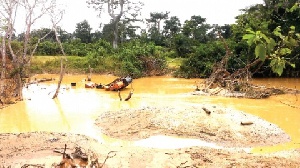After the concerted fight against illegal mining, popularly known as galamsey, Ghanaians would have to brace themselves up for another national fight if the threat posed by forest depletion is anything to go by.
It is estimated that Ghana is losing 2% of its forest cover every year, implying that in twenty years, Ghana would be left with no forests, if the trend is not stopped.
At a two-day training programme organized by the Nature and Development Foundation (NDF), a Non-Governmental Organization (NGO) in the forestry sector, Mr. Mustapha Seidu, Director of the Foundation, indicated that, government is yet to implement one of the policies proposed to curtail the problem.
According to Mr. Seidu, government is yet to push the passage of the Public Procurement Policy (PPP) on Timber and Timber Products, that seeks to bind it to accept the use of only legal timber or logs for execution of public projects and works.
The Policy, left in abeyance for some time now, would compel government to insist on contractors on government contracts utilizing legal timber in the execution of their projects and to prove the source of the wood.
This, according to NDF, would serve as a significant step in the country?s attempt to stop deforestation and to give government the moral right to enforce forestry laws of the country.
?It makes no sense for government to deploy forest guards and the security agencies to stop illegal logging only for it to buy logs without confirming the source,? he asserted, adding that, ?government buying illegally logged wood means shooting itself in the foot.”
For his part, Mr. Glen Asomaning, Operations Director of NDF, noted that Ghana set off a century ago with a forest cover of some 8.2 million hectares but today the country has just about 1.6 million hectares left and still depleting. A hectare is about the size of a football pitch.
?This poses a serious threat to our water bodies, animals, cocoa farms and more importantly the lives of all Ghanaians since we all depend directly or indirectly on the forests for our living,? he disclosed.
His revelations showed that Ghana was sitting on a time-bomb with deadly social, economic and environmental consequences on the people.
Forestry is currently contributing 2% to Ghana?s Gross Domestic Products (GDP), dropping from 4% in 2006, a worrying indicator of a downwards trend in the sector, raising concerns among stakeholders.
The cocoa industry is feeling the effects of forest depletion as the growth of cocoa trees is largely dependent on the canopies provided by forest trees.
Madam Margaret Appiah, Project Officer of NDF, disclosed that Ghana signed on to the Voluntary Partnership Agreement (VPA) with the European Union (EU) in 2009 under the Forest Law Enforcement, Governance and Trade (FLEGT) Action Plan to ensure sanity in the forestry sector.
That calls for the strict enforcement of the forestry laws in the country, thus the need to implement the policy to make government the way paver for the private sector.
The NDF, according to Madam Appiah, has gone through series of processes with government on the Policy with training for public procurement officers, consultations and reviews.
The Policy was mentioned in the 2016 Budget Statement in Parliament but has been put on hold with the change in government. The NDF wants the government to take the passage of the Policy serious to save the nation from a catastrophe worse than the threat posed by illegal mining (galamsey).
The entire nation responded to a call to end illegal mining (galamsey), leading to the formation of a joint military and police taskforce to enforce the ban on the negative environmental practices.
A similar action plan is urgently required to stop the menace of illegal logging that has more dangerous consequences than galamsey.













